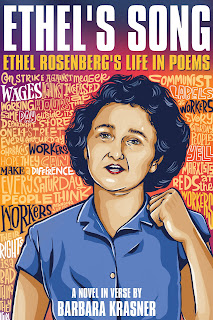Barbara Krasner is the author of the new young adult book Ethel's Song: Ethel Rosenberg's Life in Poems. Her other books include 37 Days at Sea, and her work has appeared in a variety of publications, including Jewishfiction.net and Kelsey Review. She teaches in the Holocaust & Genocide Studies Program at The College of New Jersey.
Q: What inspired you to write a YA book in verse about Ethel Rosenberg?
A: An editor friend of mine suggested it during one of her writing retreats. We agreed that there had to be more to the story than she was a Soviet spy and sentenced to the electric chair. I wrote a proposal for a YA nonfiction in the fall of 2015 and secured an agent.
The proposal went to that editor's acquisition committee and they wanted to see how I would treat the execution. I continued to work on the prose version and completed a draft. Then, at her 2017 retreat, the editor asked, "What if you turned this whole thing into verse?"
I felt immediately relieved and liberated. Poetry allowed me to express Ethel's emotions through a variety of forms, including the villanelle for moments of deep despair. It also helped me present taut images, as one book reviewer wrote.
Q: What would you say are some of the most common perceptions and misconceptions about Ethel Rosenberg?
A: The most common perceptions were and continue to be that she was a convicted spy who sold atom bomb secrets to the Soviet Union with her husband. There is a tremendous amount of discrimination against her by people who don't know the facts. It's time for her story to come out. British journalist Anne Sebba did this with a biography for the adult market in 2021. I'm doing this for teens in 2022.
Q: The Kirkus Review of the book says, in part, "Ethel Greenglass’ story has often been told with her husband, Julius Rosenberg, at the forefront; now it’s her turn." How would you describe the relationship between the two?
A: They were deeply in love and totally dedicated to each other. It's a real love story pitted against Ethel's dysfunctional family and social injustices framed by the emergence of the Soviet Union as a superpower after World War II and continued antisemitism.
Q: What do you see as Ethel Rosenberg's legacy today?
A: Ethel has been exonerated by the City of New York and her sons have been working diligently for decades to bring the truth to light by, for instance, using the Freedom of Information Act to open up the trial files.
Q: What are you working on now?
A: I'm under contract to write another YA novel in verse, Camp Nordland, about two Newark, N.J., teenagers--one Jewish and one of German heritage-- who grapple with the emergence of a German-American Bund camp in Andover, N.J., and the effects of that camp on their friendship.
Q: Anything else we should know?
A: I think it helps that I'm a historian, well versed in American history (no pun intended). Ethel's story is shaped by time and place. Living in lower Manhattan during the Great Depression, looking for a better life; Nazi Germany's Final Solution and its attack on the Soviet Union; and the postwar emergence of the Cold War and government-induced fear, uncertainty, and doubt.
--Interview with Deborah Kalb


No comments:
Post a Comment